Related Research Articles

Shashi Kapoor (pronounced [ʃəʃi kəpuːɾ]; was an Indian actor and film producer who is best known for his work in Hindi films. A recipient of several accolades, including four National Film Awards and two Filmfare Awards, he also featured in a number of English-language international films, particularly films produced by Merchant Ivory. The Government of India honoured him with the Padma Bhushan in 2011, and the Dadasaheb Phalke Award, in 2014, for his contribution to Indian cinema.

Rabindra Sangeet, also known as Tagore Songs, are songs from the Indian subcontinent written and composed by the Bengali Polymath Rabindranath Tagore, winner of the 1913 Nobel Prize in Literature, the first Indian and also the first non-European to receive such recognition. Tagore was a prolific composer with approximately 2,232 songs to his credit. The songs have distinctive characteristics in the music of Bengal, popular in India and Bangladesh.

Nandikar is a theatre group in India. The group has its headquarters in Kolkata in the state of West Bengal, but works around the world.

Aradhana (transl. "Devotion") is a 1969 Indian Hindi romantic drama film directed by Shakti Samanta, starring Sharmila Tagore and Rajesh Khanna. It won the Filmfare Award for Best Film at the 17th Filmfare Awards. Tagore won her only Filmfare Best Actress Award. Originally released in Hindi and dubbed in Bengali, Aradhana's huge success led to two remakes: the Tamil film Sivagamiyin Selvan (1974) and the Telugu film Kannavari Kalalu (1974). This film is counted among the 17 consecutive hit films of Rajesh Khanna between 1969 and 1971, by adding the two hero films Marayada and Andaz to the 15 consecutive solo hits he gave from 1969 to 1971. Aradhana was a blockbuster in India and the Soviet Union. The theme of the movie was based on the 1946 film To Each His Own.
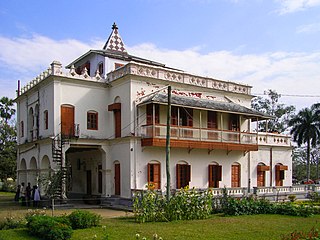
The works of Rabindranath Tagore consist of poems, novels, short stories, dramas, paintings, drawings, and music that Bengali poet and Brahmo philosopher Rabindranath Tagore created over his lifetime.
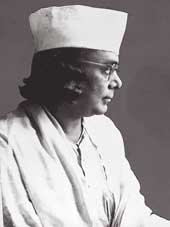
Bengali literature denotes the body of writings in the Bengali language. Bengali has developed over the course of roughly 1,300 years. The earliest extant work in Bengali literature is the Charyapada, a collection of Buddhist mystic songs in Old Bengali dating back to the 10th and 11th centuries. The timeline of Bengali literature is divided into three periods: ancient (650-1200), medieval (1200-1800) and modern. Medieval Bengali literature consists of various poetic genres, including Hindu religious scriptures, Islamic epics, Vaishnava texts, translations of Arabic, Persian and Sanskrit texts, and secular texts by Muslim poets. Novels were introduced in the mid-19th century. Nobel Laureate Rabindranath Tagore is the best known figure of Bengali literature to the world. Kazi Nazrul Islam, notable for his activism and anti-British literature, was described as the Rebel Poet and is now recognised as the National poet of Bangladesh.

Rabindranath Tagore was a Bengali polymath who worked as a poet, writer, playwright, composer, philosopher, social reformer and painter. He reshaped Bengali literature and music as well as Indian art with Contextual Modernism in the late 19th and early 20th centuries. Author of the "profoundly sensitive, fresh and beautiful" poetry of Gitanjali, he became in 1913 the first non-European and the first lyricist to win the Nobel Prize in Literature. Tagore's poetic songs were viewed as spiritual and mercurial; however, his "elegant prose and magical poetry" remain largely unknown outside Bengal. He was a fellow of the Royal Asiatic Society. Referred to as "the Bard of Bengal", Tagore was known by sobriquets: Gurudev, Kobiguru, Biswakobi.
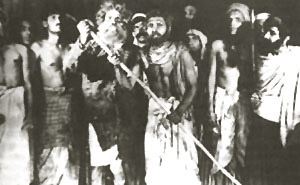
Bengali theatre primarily refers to theatre performed in the Bengali language. Bengali theatre is produced mainly in West Bengal, and in Bangladesh. The term may also refer to some Hindi theatres which are accepted by the Bengali people.
The Tagore family, with over three hundred years of history, has been one of the leading families of Calcutta, India, and is regarded as one of the key influencers during the Bengali Renaissance. The family has produced several persons who have contributed substantially in the fields of business, social and religious reformation, literature, art and music.
Gopeshwar Banerjee or Gopeshwar Bandopadhyay (1880–1963) was an Indian classical singer and musicologist, belonging to Bishnupur gharana of Hindustani music, which originated in Bishnupur in West Bengal. He was known for his khyal and dhrupad renditions, besides Rabindra Sangeet. He also sang thumri, and most notably the thumri, Kon Gali Gayo Shyam, in Raga Mishra Khamaj, which he popularised. As a musicologist, he published several books of rare compositions with musical notations, including dhrupad and Rabindra Sangeet.
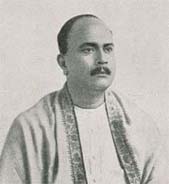
Atul Prasad Sen was a Bengali composer, lyricist and singer, and also a lawyer, philanthropist, social worker, educationist and writer.
Ajitesh Bandopadhyay was an actor, playwright, activist and director. He along with Shambhu Mitra and Utpal Dutt are considered to be the doyens of Bengali theatre of the post - Independence era.
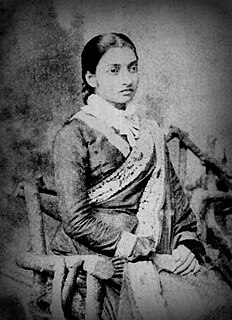
Jnanadanandini Tagore was a social reformer who pioneered various cultural innovations and influenced the earliest phase of women's empowerment in 19th century Bengal. She was married to Satyendranath Tagore, Rabindranath Tagore's elder brother. The Tagores are a scion of the Jorasanko Tagore Family.
Asit Bandopadhyay was a Bengali dramatist, screenwriter and actor. He was associated with the Nandikar theater group. He lived and worked in Kolkata, India. He was a playwright, screenwriter, director and actor.

Stories by Rabindranath Tagore is a 2015 Indian Hindi television series which aired on the EPIC channel. It is directed by Anurag Basu.
Atithi is a 1965 Bengali film based on a short story by Rabindranath Tagore, and directed by Tapan Sinha. It tells a simple story about a teenage boy who prefers the life of a wanderer to the confines of a domestic life. At the 13th National Film Awards, it won the National Award for the Second Best Feature Film. It also won several BFJA Awards. It was India's competitive entry at the Venice International Film Festival in 1966, where it was nominated for the Golden Lion. The film was remade in Hindi as Geet Gaata Chal.
Chhuti is a 1967 Bengali film, based on a novel by Bimal Kar. It marked the directorial debut of Arundhati Devi, who also wrote the screenplay and composed the music for the film. At the 14th National Film Awards, it won the National Film Award for Best Film Based on High Literary Work. It also won a number of BFJA Awards, including Best Director.

Mrinalini Devi was a translator and the wife of Nobel laureate poet, philosopher, author and musician Rabindranath Tagore. She was from the Jessor district, where her father worked at the Tagore estate. In 1883, at the age of nine, she married Tagore.
Bibhash Chakraborty is an Indian Bengali actor and theatre personality. He is also a social activist. He is a prolific writer too. He was associated with Paschim Banga Natya Akademi for many years.
References
- ↑ Paul, Samiran Kumar; Prasad, Amar Nath (2006). Recritiquing Rabindranath Tagore. Sarup & Sons. ISBN 9788176256612.
- ↑ Rajadhyaksha, Ashish; Willemen, Paul (10 July 2014). Encyclopedia of Indian Cinema. Routledge. ISBN 9781135943189.
- ↑ "Megh-o-Roudra (1969)". Indiancine.ma. Retrieved 14 July 2019.